A brief introduction. I received an email about a week ago asking if Angry Bear would be interested. I wish I had posted it then. The survey reflects what students of all ages are thinking about Climate Change. A good read . . . ~~~~~~~~ A BestColleges survey reveals the majority of students think climate change threatens their personal safety — and that policymakers should do more to address it. “40% of Likely Student Voters Say Climate Change Motivates Them in Midterms,” Best Colleges, Jessica Bryant as edited by Rebecca Long. October 26, 2022 Climate change is an urgent problem in the eyes of most students — so much so that it’s driving them to vote this November. In a new BestColleges survey of 1,002 current or prospective
Topics:
run75441 considers the following as important: climate change, Education, Hot Topics, Journalism, Students
This could be interesting, too:
NewDealdemocrat writes JOLTS revisions from Yesterday’s Report
Joel Eissenberg writes No Invading Allies Act
Joel Eissenberg writes How Tesla makes money
NewDealdemocrat writes January JOLTS report: monthly increases, but significant downward revisions to 2024
A brief introduction. I received an email about a week ago asking if Angry Bear would be interested. I wish I had posted it then. The survey reflects what students of all ages are thinking about Climate Change. A good read . . .
~~~~~~~~
A BestColleges survey reveals the majority of students think climate change threatens their personal safety — and that policymakers should do more to address it.
“40% of Likely Student Voters Say Climate Change Motivates Them in Midterms,” Best Colleges, Jessica Bryant as edited by Rebecca Long. October 26, 2022
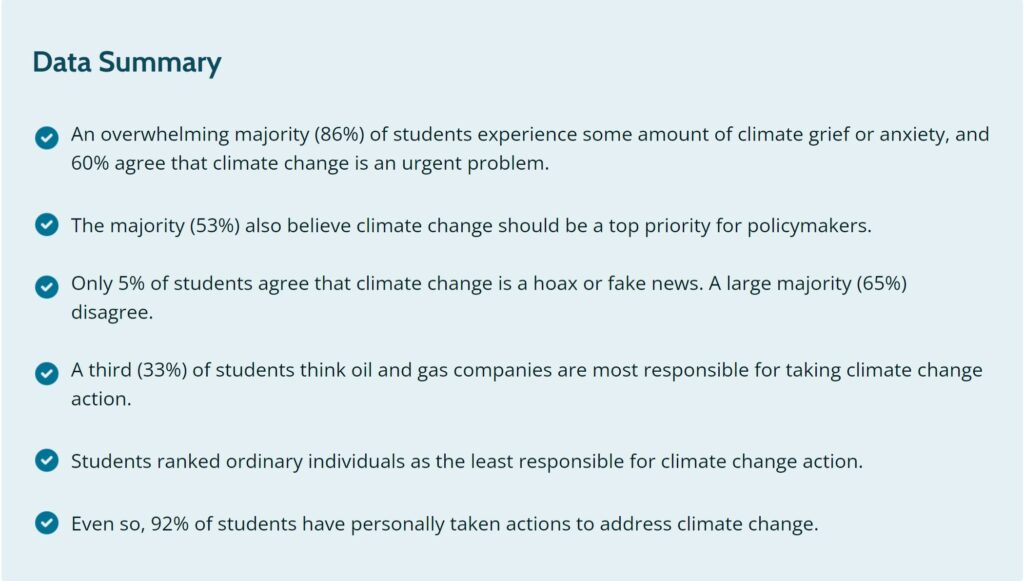
Climate change is an urgent problem in the eyes of most students — so much so that it’s driving them to vote this November.
In a new BestColleges survey of 1,002 current or prospective undergraduate and graduate students, 40% of those who plan to vote say that climate change is the primary issue that motivates them to do so in the 2022 midterm elections.
An even larger percentage of these students (46%) say that a candidate’s stance on climate change will influence how they vote on November 8.
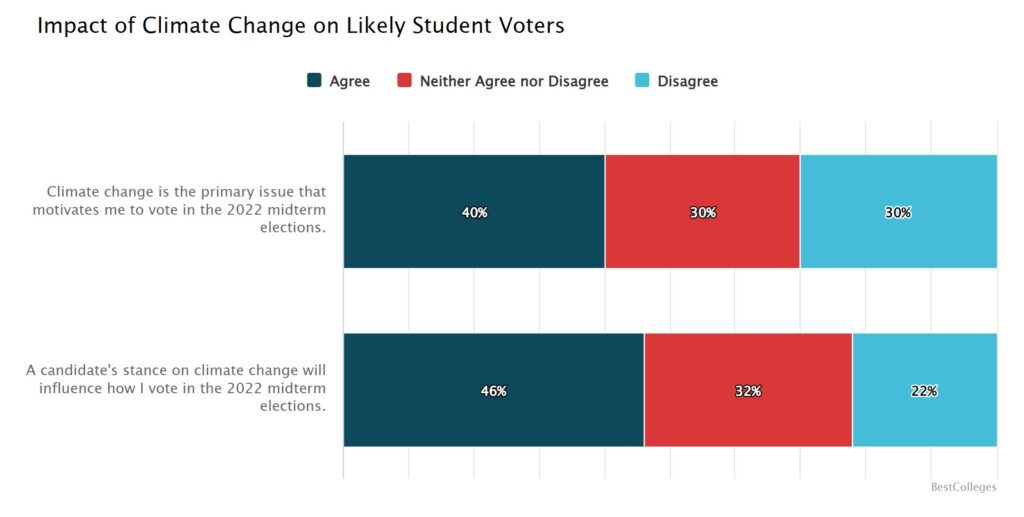
Most Students, Regardless of Party, Disagree That Climate Change Is a Hoax
The overwhelming majority of surveyed students (65%) disagree that climate change is a hoax or fake news. Yet, about a quarter of students (23%) still say they would consider voting for a political candidate who believes it is.
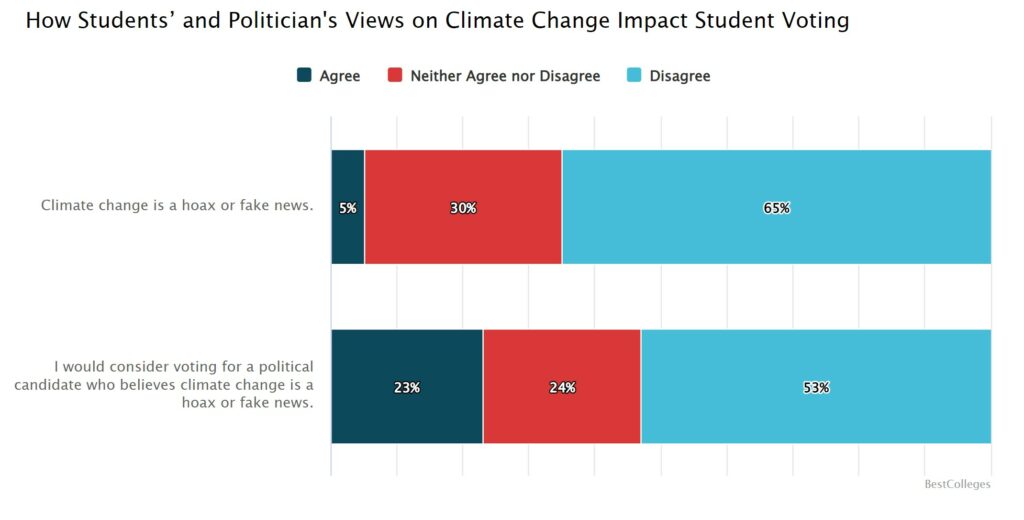
Democrats are significantly more likely than Republicans to say they disagree that climate change is a hoax or fake news (73% vs. 58%). Republican students are significantly more likely than Democrats to answer neutrally (34% vs. 23%).
Students who identify as Democrats are significantly more likely than those who identify as Republicans to say a candidate’s stance on climate change will influence their vote (60% vs. 34%).
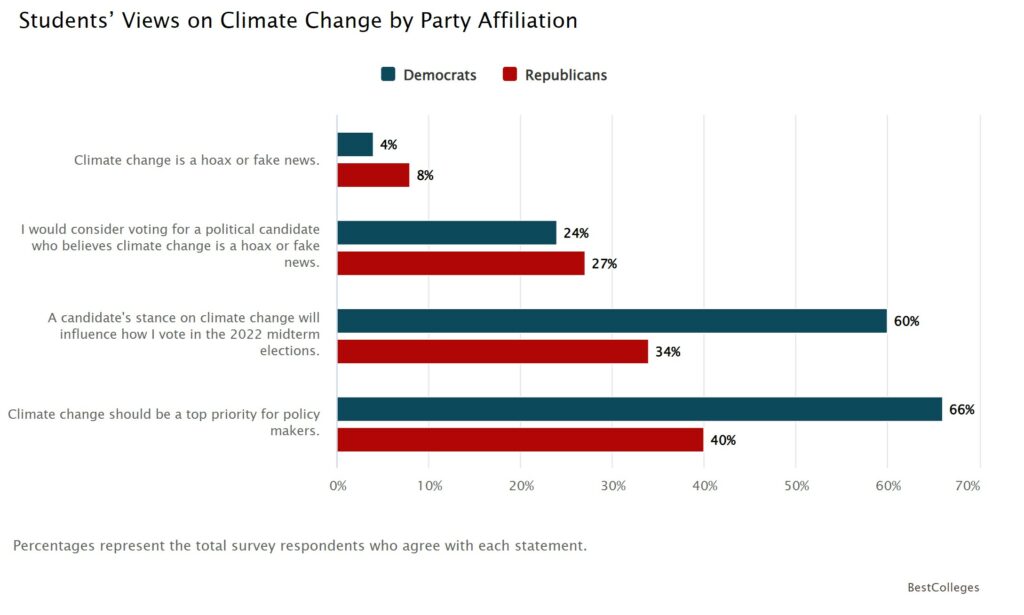
Only about 1 in 5 students (21%) believe politicians are currently doing enough to address climate change. And most students (53%) agree that climate change should be a top priority for policymakers.
Millennial students are significantly more likely than Gen Z students to say they believe climate change should be a top priority for policymakers (62% vs. 47%). But they are also more likely to say politicians are doing enough to address it (28% vs. 18%).
When it comes to who’s responsible for making a change, students are more likely to point to large corporations than the average citizen. A third of students (33%) rank oil and gas companies as most responsible for climate change action. A larger percentage rank ordinary individuals as least responsible (37%).
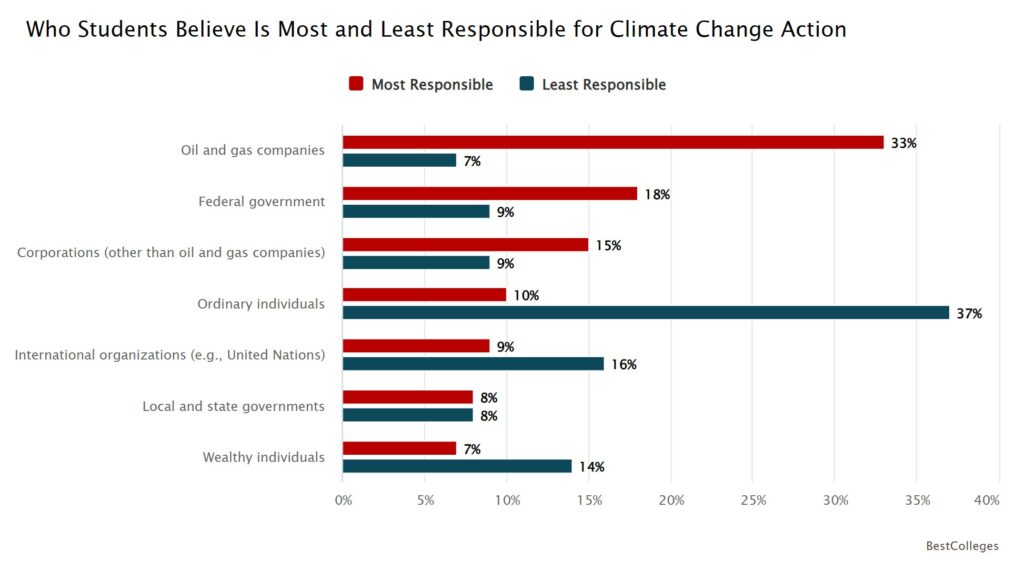
What Students Believe About Climate Change
An overwhelming majority of students (85%) experience some amount of grief or anxiety related to climate change and other environmental threats, and most (62%) also agree that climate change contributes to an increase in extreme weather events. About half of students (51%) say climate change threatens their personal health and safety.
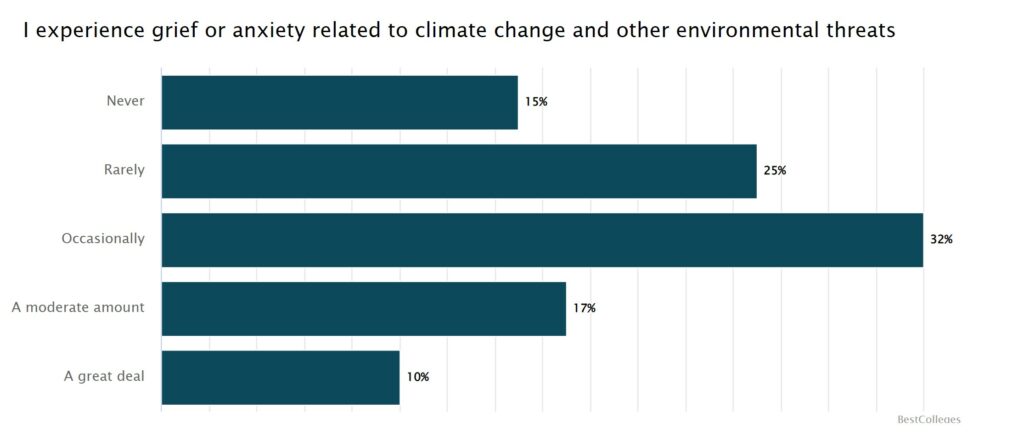
Sixty percent of students also agree that climate change is an urgent problem. However, there are notable demographic differences between the students who are likely to believe this and those who are not.
BIPOC students, for example, are slightly less likely than white students to say that climate change is an urgent problem (56% vs. 63%). Gen Z students are less likely than millennials to say the same (57% vs. 65%).
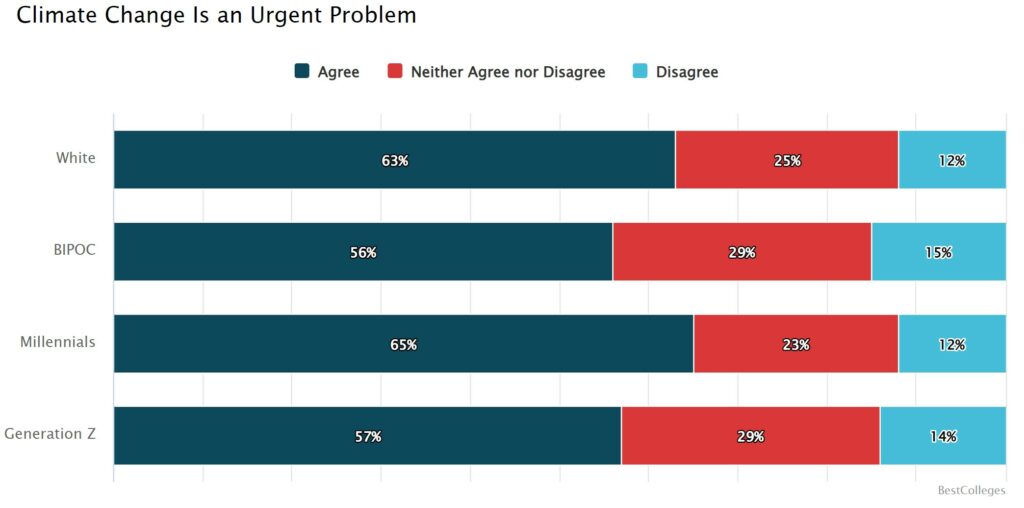
How Students Are Addressing Climate Change
The majority of students (92%) have personally taken actions to address climate change. Students most commonly say they do so by using a reusable water bottle (56%), reducing their energy use (54%), and reducing their food waste (52%).
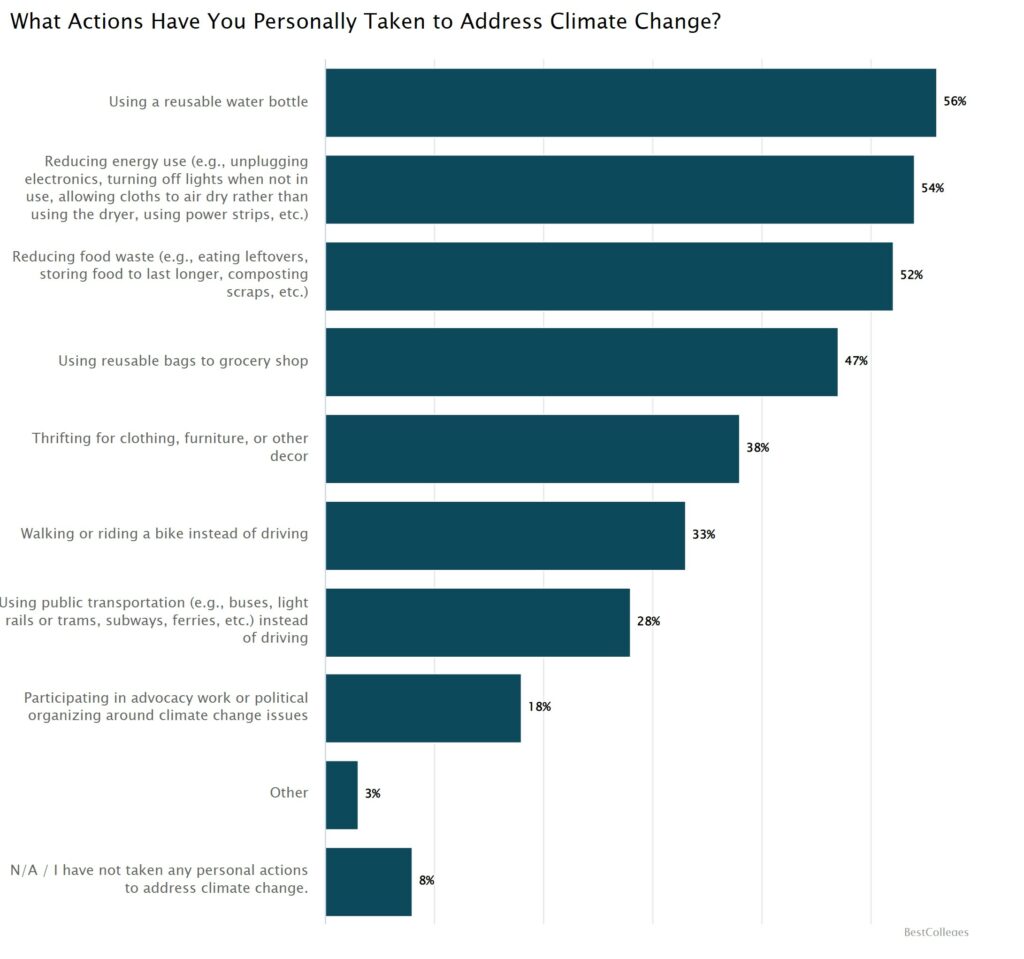
For some students, climate change not only influences the personal actions they take but also the decisions they make about their future.
About a quarter of students (24%) say climate change influenced where they chose to go to college and an equal number say it impacts their course of study or career path.
A slightly higher percentage of students (29%) say that climate change will influence their job search and/or decision to accept a position. And more than a third of students (36%) say it will influence where they choose to live after college.
Men are significantly more likely than women to say that climate change will influence almost all these choices for them.
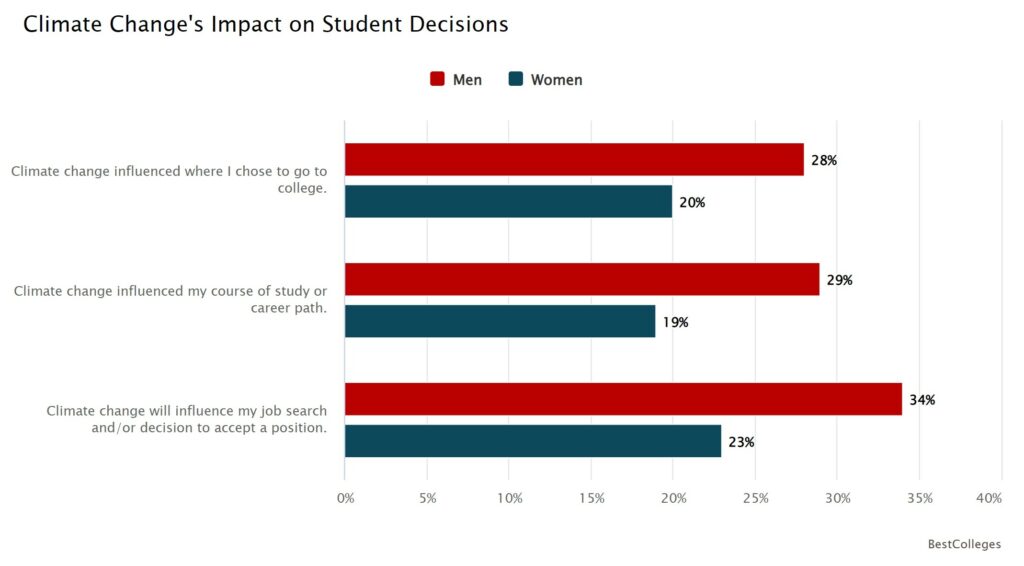
As climate change issues continue to plague students’ minds, it’s clear that politicians would attract a majority of student voters in the midterms from prioritizing climate action.
Methodology: The survey was conducted from September 28 – October 3, 2022, and was fielded by Pure Spectrum. Survey participants included 1,002 respondents nationwide who were currently enrolled in or planning to enroll in an on-campus or hybrid undergraduate or graduate degree program at a college or university in the next 12 months. Respondents were 16-59 years of age and currently pursuing or planning to pursue an associate, bachelor’s, master’s, doctoral, or professional degree. The respondents for the survey were screened by various quality checks, including systems like Relevant ID, and responses were manually reviewed to ensure consistency and accuracy.
